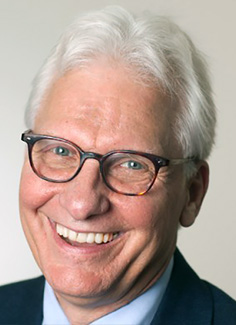Lifestyle
Copyright@ Australian Catholic University 1998-2026 | ABN 15 050 192 660 CRICOS registered provider: 00004G | PRV12008
Copyright@ Australian Catholic University 1998-2026 | ABN 15 050 192 660 CRICOS registered provider: 00004G | PRV12008

It’s been almost four decades since two pioneering psychologists proposed a radical shift in the science of motivation. Impact sat down with one of those men, Professor Richard Ryan, who says it’s time to ditch the carrots and sticks.
It was the mid-1970s when two young researchers at the New York-based University of Rochester began to ponder the question of what motivates human beings.
At the time, the study of motivational psychology was dominated by behaviourists, who believed people had to be goaded into action. The best way of doing that, they argued, was to prod them with rewards and punishments.
Edward Deci and Richard Ryan had a nagging sense that the behaviourists were missing something. They were about to turn the so-called “carrot and stick” approach to motivation on its head.
“We were always struck by the natural energies people had — we realised people really want to learn, they’re naturally interested and there are a lot of internal motivations that don't depend on external reinforcements like carrots and sticks,” said Richard Ryan, a clinical psychologist and professor at ACU’s Institute for Positive Psychology and Education.
“We were interested in looking at those natural motivations that people already have — exploring what spurs them and what kills them.”
After years of collaborative research, Deci and Ryan emerged with Motivation and Self-Determination in Human Behavior (1985), their first book on Self-Determination Theory (SDT). It put the renegade duo on the map, leading hundreds of other scholars to support the theory and build on their initial findings.
In 2017, they released a new book, the first full explanation of SDT for more than 30 years. Deci and Ryan are now among the leading researchers in psychology, and SDT is the world’s most cited theory of motivation. They are “the sun around which all this other research orbits”, said Dan Pink, author of Drive: The Surprising Truth About What Motivates Us.
"They’re true pioneers,” Pink said. “Forty years from now, we’ll look back on them as two of the most important social scientists of our time.”
At its core, the theory assumes that people are naturally curious to learn, develop knowledge and take action. These intrinsic tendencies are grounded in three fundamental psychological needs: competence (the ability to develop skills and master tasks), autonomy (acting of our own will) and relatedness (a sense of belonging and connectedness).
When those basic needs are satisfied and cultivated, we’re more likely to be motivated to do things, without seeking external rewards. This leads to what Deci and Ryan call “high quality motivation”.
“Essentially we’re saying that these are the conditions under which people operate optimally — when they're most engaged, when they're most passionate and most involved in what they're doing — and also the conditions under which people experience their best wellbeing, are most satisfied with their life and have the most positive experiences,” Professor Ryan said.
From the beginning, they knew there’d be resistance to their conclusions, and made an agreement to stick to things they could back with empirical evidence.
As if to rub salt into the wounds of behaviourists, Deci and Ryan found that using rewards and punishments was not only less effective than had long been supposed, it could actually diminish motivation and engagement.
In an early experiment, when Deci tasked two groups of psychology students with solving a puzzle, the participants who were paid tended to lose interest, while most of those who weren’t given money continued trying to solve it. He concluded that the students who were paid had lost their intrinsic motivation to complete the task.
“We were out of the mainstream,” Ryan told the Rochester Review.“The idea that rewards would sometimes undermine motivation was anathema to behaviourists.”
Imagine you had a niece just starting school whose name was Betty. As a toddler and pre-schooler, Betty had a natural love of books. Her parents began to encourage her by offering rewards, like pocket money. The more she read, the more she got. At every chance, Betty would drag an adult to her favourite chair to read to her. Her moneybox was soon flush with coins. She bought all sorts of things — dolls, toy cars, even the odd book — but after a while, her parents stopped rewarding her for reading. She began to lose interest in books, unless there was a reward involved.

“When I say I’ll give you money or a gold star or a pizza for reading books, the message I'm giving you is that the books themselves aren’t enjoyable enough. You need something extra in order to do it,” Professor Ryan said. “You’re actually saying the pizzas are more important than the books, because that’s the reward, and it sends the wrong message about what's of value.”
Ryan and Deci aren’t saying that rewards and punishments don’t work; rather, that the desired behaviour becomes dependent on them, that they result in a low-quality motivation and taint a person’s feelings about the value of the task at hand. Those who focus on this controlled type of motivation “miss out on the many benefits of autonomous motivation, which include personal growth, true engagement and creativity”.
The main focus of their work has been to help people to internalise the desire to keep acting in the absence of rewards. The goal is for people to choose to be highly engaged because they see the inherent value in their task and find an interest, passion and excitement for it.
SDT is more than a theory; it has been applied to many realms, including parenting, relationships, the workplace, education, healthcare and physical activity.
But in some contexts, the focus on rewards — on star charts, grading systems, quotas and incentives — hangs on with an iron grip.
To quote Dan Pink, the fact that rewards undermine intrinsic motivation is “one of the most robust findings in social science, and also one of the most ignored”. Think of the banking firm that uses bonuses to drive its workers, or the junior sports coach who employs fear to motivate his young players.
“The reason that people cling to this belief is that when you take out a big stick and threaten somebody with it, they usually jump, so you get an immediate confirmation of your theory,” Professor Ryan said.
“The trouble is that you don't see the collateral damage to it, and then the more you control the people around you, the more they only respond when you get controlling. So you say, ‘nobody is motivated around me until I get controlling — they need the threats and incentives’. Well yeah, that's true for you because you created that very environment. You trained them in a way that they won't move until you get out the stick or the carrot.”
In general, though, Professor Ryan said he was “impressed and humbled with the amount of social change” that’s come through the application of SDT, especially in the workplace and professional sport. Education is one area where the progress has been slower than he would have liked.
“A lot of teachers intuitively understand motivational principles, but sadly the politics of schooling interferes with teachers doing the things they're trained to do well,” Professor Ryan said.
“The focus on the grading system, on high stakes testing and the pressures towards outcomes in schools, these things crowd out good motivational practice in classes, and it’s an area in which I'd like to see a lot more change.”
Since the early days of their collaboration, Ryan and Deci have cut against the grain. That continues to this day, not only in their own research, but also in the work of other scholars who have elaborated and refined their theory.

In recent years, studies have focused on how people’s goals and aspirations either satisfy or don’t satisfy their fundamental psychological needs. A body of research across 35 countries has shown that those who pursue material wealth and other external rewards like fame and the approval of others are less likely to be happy.
“These are all extrinsic motivations, and even when you’re successful at attaining those things, you’re less likely to have a greater sense of wellness,” Professor Ryan said. “You’re chasing fame and money, but you give up autonomy to get there, you give up relatedness to get there, so your basic needs aren’t being satisfied.”
The reason researchers pursue the topic of materialism and its effect on wellbeing is, he adds, “to help people get the idea that it’s not always the royal road to happiness”.
“A lot of the messages that we’re confronted with in our society, in advertising and in marketing, is that getting things will make us happy,” Professor Ryan said.
“So we need counter evidence for that, which shows that what really makes us happy is loving relationships with people, doing things that have a higher purpose, living a life of virtue and excellence … these are the things that have really shown themselves, empirically, to bring happiness."
Richard Ryan, a clinical psychologist, is a Professor at ACU’s Institute for Positive Psychology and Education in Sydney. He is a widely published researcher and theorist in human motivation and wellbeing, with well over 400 published empirical articles, chapters, and books.

Interested in psychology? See what ACU has to offer.
Copyright@ Australian Catholic University 1998-2026 | ABN 15 050 192 660 CRICOS registered provider: 00004G | PRV12008